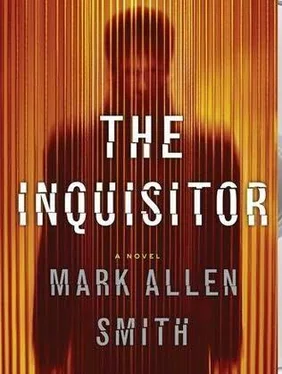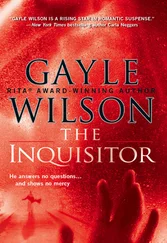Mark Smith - The Inquisitor
Здесь есть возможность читать онлайн «Mark Smith - The Inquisitor» весь текст электронной книги совершенно бесплатно (целиком полную версию без сокращений). В некоторых случаях можно слушать аудио, скачать через торрент в формате fb2 и присутствует краткое содержание. Жанр: Триллер, на английском языке. Описание произведения, (предисловие) а так же отзывы посетителей доступны на портале библиотеки ЛибКат.
- Название:The Inquisitor
- Автор:
- Жанр:
- Год:неизвестен
- ISBN:нет данных
- Рейтинг книги:5 / 5. Голосов: 1
-
Избранное:Добавить в избранное
- Отзывы:
-
Ваша оценка:
- 100
- 1
- 2
- 3
- 4
- 5
The Inquisitor: краткое содержание, описание и аннотация
Предлагаем к чтению аннотацию, описание, краткое содержание или предисловие (зависит от того, что написал сам автор книги «The Inquisitor»). Если вы не нашли необходимую информацию о книге — напишите в комментариях, мы постараемся отыскать её.
The Inquisitor — читать онлайн бесплатно полную книгу (весь текст) целиком
Ниже представлен текст книги, разбитый по страницам. Система сохранения места последней прочитанной страницы, позволяет с удобством читать онлайн бесплатно книгу «The Inquisitor», без необходимости каждый раз заново искать на чём Вы остановились. Поставьте закладку, и сможете в любой момент перейти на страницу, на которой закончили чтение.
Интервал:
Закладка:
“Bend down, Ezra, and lie down in there.”
Manacled arms outstretched, the boy did exactly as he was told, without hesitation or a sound. Geiger closed the car door and then the door to the building. He came around past Harry and slid into the driver’s seat. He sat up straight and his hands settled gently on the wheel, precisely at nine and three o’clock. To Harry, there was something vaguely childlike about Geiger’s posture. It wasn’t the first time he’d had that thought.
“You’re okay driving?”
Geiger’s eyes scanned the dashboard displays and nodded. He turned around to look at the boy, who was curled up on his side. “We’re going now, Ezra.”
A soft, guttural cluck of understanding came from the boy.
Geiger faced forward. “Don’t call me,” he said to Harry. “I’ll call you.”
No you won’t, thought Harry. He stepped back and watched the car move slowly down the alley.
Geiger drove north on Tenth Avenue. He passed two patrol cars doing slow right-lane cruises, but the traffic was light, mostly taxis. He kept his speed under thirty-five miles an hour and was making about eight blocks between red lights. He’d gotten a license five years ago, and each April since then he had rented a car and taken it out on the West Side Highway for an hour’s practice, navigating the same route every time. From the rental place on Fifty-seventh Street, he would drive two blocks west to the highway’s entrance ramp, drive north to the Ninety-sixth Street exit, circle under the highway, get back on the highway going south, and get off at Fifty-sixth Street. Round and round he drove, five circuits in all. Now, on this night that had broken free of its mooring, he was actually driving somewhere, with someone, for the first time.
His distance vision was normal but his short-range focus was still interrupted by small, sporadic blips, so even though the drizzle had become a steady rain, he changed the wipers’ setting from high to intermittent after a dozen blocks because their continual sweep exacerbated the anomaly. Raindrops bled down the windshield, stained with the colors of traffic lights. He went blocks at a time without seeing a soul.
As the light turned yellow at Sixtieth Street, Geiger slowed to a stop and turned around. The boy lay facing the seatback, shoulders rising and falling faintly.
“Be there soon,” Geiger said.
The boy’s head moved slightly on the seat in a horizontal nod, and Geiger turned back to the wheel. He could feel his pulse echoing through his veins-not faster, but with a weighty beat instead of its usual ping. He knew that he needed to be away from the movement and sound of the world. He needed the darkness and the music to usher him back to a starting place. His life was all balance, calibration, detail. He needed to reset his internal scale.
When the light turned green he hit the gas and then saw the wet blur of a bicyclist speeding into the intersection. Geiger swerved right but heard the car’s front bumper clip the back wheel of the bicycle, followed by the tinny scraping of metal skidding across asphalt. He pounded the brakes, sending the boy thudding to the floor in back.
The rider had come to a stop against a parked car, pinned beneath his mangled ten-speed. He wasn’t moving. Geiger turned around to check on the boy: he was wedged down sideways against the backs of the front seats, grunting through the tape across his mouth.
Geiger reached down and pulled him up onto the backseat. “You okay?”
A loud crack swiveled Geiger’s head to the driver’s window. Outside, the bicyclist stood with a tire pump held high beside his head in a tight fist. In the misty light of the streetlamps, it was impossible to tell whether the dark patches on his glowering face were blood or grime.
“Get out of the car, motherfucker!” the rider yelled through the window.
He was tall and chiseled, ropy muscles stretching out of his T-shirt and spandex riding shorts. Both upper arms were emblazoned with tattoos of barbed helixes. After trying the door handle and discovering that it was locked, he hammered the window again with the pump. A nickel-sized spider’s web bloomed in the glass.
“Get the fuck out here!”
Geiger’s ears were ringing. The inside of his skull felt crowded, as if his brain had grown too big for its casing. His eyes danced forward, taking in the views of the windshield and rearview mirror at the same time. Headlights in the rain cruised toward him.
“Are you coming out of that car or am I coming in?”
Geiger turned back to the bicyclist, and there, just outside the window, was a man in overalls. His wide, flat forehead shone with sweat; in his hand he held something thin and shiny. For half a heartbeat, his father stood before him. Then he was gone.
The tire pump came down on the window again, and the glass burst into a thousand tiny diamonds. The rider reached in and grabbed hold of Geiger’s jumpsuit.
“Get out here, asshole!”
Geiger’s right hand shot out the window frame, anchored itself in the bicyclist’s hair, and pulled him halfway into the front seat. Growling in anger, the man tried to bring his arms through the opening to wage some form of attack, but the fingertips of Geiger’s left hand dug into the soft cavity above the man’s clavicle. The growls turned to screams.
Geiger pulled the man nose to nose. His fingers relaxed and the screaming stopped.
“Go-away-now,” Geiger said.
The man stared at him wide-eyed, breathless, raindrops beaded on his face.
“Do you understand?” Geiger asked.
The man nodded. Geiger let go and the rider wriggled his way out the window, stumbling back onto the street, hands going up to his neck.
Geiger’s foot found the gas pedal and he drove off, keeping the point of the speedometer’s arrow exactly between 30 and 40.
Geiger’s block was quiet. Nothing moved except for rainwater in the gutters. There were few residential units on the street, and the uniform shop and bodega didn’t open until six, the auto body shop and storage warehouse an hour later. Geiger’s building was between a bath and shower supply outlet and an empty storefront. Constructed of tawny bricks, it was twenty feet wide, thirty feet deep, and two stories high. Its windows were boarded up and had been for a long time.
Years ago, the place had belonged to a Serb with whom Geiger had worked in renovation. When jobs were scarce, the Serb would offer Chinese food to friends and coworkers in exchange for their help in gutting the place, and before Geiger went into his current line of work he’d spent a dozen nights ripping out rotted walls and flooring. Five years later, he had gone back. Boards covered the windows, and the dumpster in the alley was filled with drywall so moldy that it obviously hadn’t been emptied in months. But the Serb still lived there; he invited Geiger in and told him that he’d run out of money and the dream had died. That same afternoon, Geiger and the Serb worked out a deal, and two days later Geiger paid him in cash. He had had two-thirds of the price in hand and borrowed the rest from Carmine on friendly terms.
Geiger had done all the work on the place himself. He insulated the second floor and closed it off, upgraded the plumbing and wiring, and fenced in the small backyard. Before putting up drywall, he built a floor-to-ceiling layer of cinder blocks across all the walls and then fit every fourth block with a mixture of nitroglycerine and RDX in shaped charges that would detonate inward. He painted the walls with a soft gray he found at Sherwin-Williams called Tradewind.
Then he began creating the floor.
He had carried the design around in his head for years. Three or four days a week he made the rounds of reno sites in Brooklyn and Harlem-brownstones, small buildings, factories-searching for and buying discarded antique flooring. Sometimes he might come back with a six-foot plank of chestnut, other times a few eight-inch squares of hemlock. Employees at lumber and reclamation companies in the boroughs came to expect his biweekly visits as he sought out the more esoteric kinds of wood he needed.
Читать дальшеИнтервал:
Закладка:
Похожие книги на «The Inquisitor»
Представляем Вашему вниманию похожие книги на «The Inquisitor» списком для выбора. Мы отобрали схожую по названию и смыслу литературу в надежде предоставить читателям больше вариантов отыскать новые, интересные, ещё непрочитанные произведения.
Обсуждение, отзывы о книге «The Inquisitor» и просто собственные мнения читателей. Оставьте ваши комментарии, напишите, что Вы думаете о произведении, его смысле или главных героях. Укажите что конкретно понравилось, а что нет, и почему Вы так считаете.












